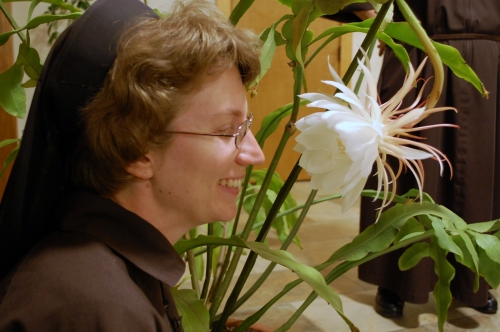Franciscan Foundations
Who would be able to narrate the sweetness he enjoyed while contemplating in creatures the wisdom of their Creator, his power and his goodness? Indeed, he was very often filled with a wonderful and ineffable joy from this consideration while he looked upon the sun, while he beheld the moon, and while he gazed upon the stars and the firmament. O simple piety and pious simplicity! Toward little worms even he glowed with a very great love, for he had read this saying about the Savior: I am a worm, not a man. Therefore, he picked them up from the road and placed them in a safe place, lest they be crushed by the feet of the passersby. (St. Francis of Assisi, Thomas of Celano, Part I).
St. Francis’ Sense of Awe and Wonder
 Reverence implies not only deep respect, but also awe, affection and love. St. Francis’ reverence for creation was grounded in his profound sense of awe and wonder that went beyond simple respect and flowed out of his love of God, the Creator. To him, all creation spoke of the goodness of God, and in his Canticle of the Creatures, he sings the particular praises of each element of creation as it reflected an aspect of God’s goodness. His reverence caused him to respect the inherent dignity of each of God’s creatures, whether it be the birds, to whom he preached, or the wolf at Gubbio, whom he tamed, or the worms as Thomas of Celano recounted in the story above. His reverence also inspired him to love other humans and to see their inherent dignity, even those like lepers who were the outcasts and unwanted in society.
Reverence implies not only deep respect, but also awe, affection and love. St. Francis’ reverence for creation was grounded in his profound sense of awe and wonder that went beyond simple respect and flowed out of his love of God, the Creator. To him, all creation spoke of the goodness of God, and in his Canticle of the Creatures, he sings the particular praises of each element of creation as it reflected an aspect of God’s goodness. His reverence caused him to respect the inherent dignity of each of God’s creatures, whether it be the birds, to whom he preached, or the wolf at Gubbio, whom he tamed, or the worms as Thomas of Celano recounted in the story above. His reverence also inspired him to love other humans and to see their inherent dignity, even those like lepers who were the outcasts and unwanted in society.
St. Francis’ reverence for creation honored each individual element or creature in its integrity as well as in its inherent interconnectedness with all other things. It was because of his deep reverence that he could call creation “Brother,” “Sister,” and “Mother” and that he could respect the lowliest of creatures and want to protect them from harm. His reverence inspired in him a deep sense of belonging and fraternity with all creation and was a constant source of relationship with God the Creator as well as with his Incarnate Son. These educational modules seek to cultivate such a reverential, fraternal attitude as a foundation for Catholic creation care.
Laudato Si’ Connections
Throwaway Culture
Today we experience the relentless drive of excessive consumerism and the hard edge of technological culture that tend to drive out a sense of reverence. In Laudato Si’ Pope Francis laments “the continued acceleration of changes affecting humanity and the planet, coupled today with a more intensified pace of life and work which might be called ‘rapidification’” (LS §18), which have tended to produce “a throwaway culture that affects the excluded just as it quickly reduces things to rubbish” (LS §22). Contemporary Western culture is also marked by a great rift between the sacred and the secular and a shift toward materialism and scientism, both of which obfuscate the metaphysical and spiritual dimensions of the world around us. These influences have encouraged a self-centered mindset along with a spirit of indifference toward the integrity of ecosystems, the intrinsic goodness of all creatures, the dignity of human life, and the huge inequities in the distribution of the earth’s goods. We experience as well a tendency to relegate the message of Laudato Si to a purely socio-political treatise on environmental justice. The spirit of Franciscan reverence is important to counter all of these distractions and dehumanizing influences and to assist persons in feeling deeply connected with God, with others, and with the earth.
Serene Attentiveness
As Pope Francis explains in Laudato Si (§65), the goodness of created things, including all the earth, is part of God’s plan for us: “God saw that everything that he had made” and it was very good (Gen.1: 31). To avoid the degradation or perversion of this goodness through selfishness, indifference, excessive consumerism, and wastefulness, the Pope proposes a stance of what he calls “serene attentiveness,” which is another way of understanding the theme of reverence:
 We are speaking of an attitude of the heart, one which approaches life with serene attentiveness, which is capable of being fully present to someone without thinking of what comes next, which accepts each moment as a gift from God to be lived to the full. Jesus taught us this attitude when he invited us to contemplate the lilies of the field and the birds of the air, or when seeing the rich young man and knowing his restlessness, “he looked at him with love” (Mk 10:21). He was completely present to everyone and to everything, and in this way he showed us the way to overcome that unhealthy anxiety which makes us superficial, aggressive and compulsive consumers (LS § 226).
We are speaking of an attitude of the heart, one which approaches life with serene attentiveness, which is capable of being fully present to someone without thinking of what comes next, which accepts each moment as a gift from God to be lived to the full. Jesus taught us this attitude when he invited us to contemplate the lilies of the field and the birds of the air, or when seeing the rich young man and knowing his restlessness, “he looked at him with love” (Mk 10:21). He was completely present to everyone and to everything, and in this way he showed us the way to overcome that unhealthy anxiety which makes us superficial, aggressive and compulsive consumers (LS § 226).
This attitude of serene attentiveness, or reverence, says Pope Francis, can help restore the original harmony between the Creator, humanity, and creation that “was disrupted by our presuming to take the place of God and refusing to acknowledge our creaturely limitations… It is significant that the harmony which Saint Francis of Assisi experienced with all creatures was seen as a healing of that rupture” (LS §66). St. Francis revered all creation and was able to heal that rupture because he was spiritually attuned to “[t]he Spirit of life [that] dwells in every living creature and calls us to enter into relationship with Him” (LS §88).
Particular Accent of FSE Spirituality
Living in a Spirit of Reverence
The Franciscan Sisters of the Eucharist are called to reverence the integrity of all life, from the smallest particles to the vast reaches of the cosmos, because every created thing was created by God and is calling out for relationship with us as humans. Living in a spirit of reverence can help others “experience what it means to appreciate each person and each thing, learning familiarity with the simplest things and how to enjoy them” (LS §223). Reverence is the basic attitude required to live simply, to be content with less, and to adopt sustainable lifestyles. Developing a spirit of reverence is also an important step toward living life as St. Francis did, as a continual prayer of praise. It requires developing a listening heart in order to hear better what the Lord speaks in and through the created world. These educational modules seek to help others develop this sense of reverence and simple living in the spirit of Pope Francis’ exhortation: “Teach us to discover the worth of each thing, to be filled with awe and contemplation, to recognize that we are profoundly united with every creature as we journey towards your infinite light” (LS §246).
A Consistent Life Ethic
 Not only do the Sisters reverence the earth and the extraordinary extravagance of God’s creation and seek to give praise to God through that, they also extend that reverence to human life as St. Francis did. The Sisters’ approach to creation care is animated by reverence for the dignity of human life from conception until natural death and the conviction that humans are called to protect all life – especially those humans that are marginalized, rejected, or threatened with elimination. Espousing such a consistent life ethic is essential to developing an ethic of care and for living integral ecology in the Franciscan spirit of Laudato Si’:
Not only do the Sisters reverence the earth and the extraordinary extravagance of God’s creation and seek to give praise to God through that, they also extend that reverence to human life as St. Francis did. The Sisters’ approach to creation care is animated by reverence for the dignity of human life from conception until natural death and the conviction that humans are called to protect all life – especially those humans that are marginalized, rejected, or threatened with elimination. Espousing such a consistent life ethic is essential to developing an ethic of care and for living integral ecology in the Franciscan spirit of Laudato Si’:
When we fail to acknowledge as part of reality the worth of a poor person, a human embryo, a person with disabilities – to offer just a few examples – it becomes difficult to hear the cry of nature itself; everything is connected. Once the human being declares independence from reality and behaves with absolute dominion, the very foundations of our life begin to crumble, for “instead of carrying out his role as a cooperator with God in the work of creation, man sets himself up in place of God and thus ends up provoking a rebellion on the part of nature” (LS §117).
Reverence for Human Life
A core principle undergirding these “Educating for Laudato Si’” modules is that reverence for creation includes a particular reverence for human life and for the unique place and responsibility of humans as created in the image and likeness of God. It is not always easy to live in this spirit of reverence, especially when the demands of human communities seem to conflict with those of natural communities. However, disengaging from the rapidified culture and learning to listen to nature in a spirit of reverence can help persons to see better how to reconcile apparently conflicting priorities and to embark on a path of healing. These educational modules seek to instill this spirit of reverence and to guide others on a path of healing from the wounds inflicted by lack of reverence in their relationships with God, with others, or with the earth.
Supplemental References
- Pope Francis, Laudato Si’ (2015)
- St. Francis of Assisi: Early Documents
- Wendell Berry, Life is a Miracle: An Essay Against Modern Superstition (2000).
- Romano Guardini, Letters from Lake Como: Explorations in Technology and the Human Race (1994).
- Josef Pieper, In Tune with the World: A Theory of Festivity (1965).
- Josef Pieper, Only the Lover Sings: Art and Contemplation (1990).
- Film: “Kiss the Ground” (2020).




